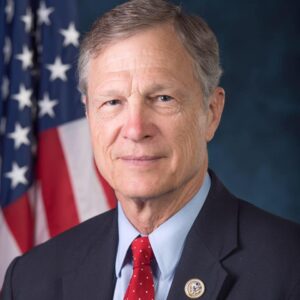Babin, Lucas Challenge NTSB On Commercial Space Investigative Authority
The top two House Republicans who oversee commercial space activities are challenging a new action by the National Transportation Safety Board to exert more authority in investigating commercial space accidents. In a letter to the NTSB they asked for more information and Rep. Brian Babin introduced a resolution stating that commercial space launch is a developmental activity, not a mode of transportation.

In the letter to NTSB chair Jennifer Homendy, Babin and Rep. Frank Lucas (R-OK) said the Board’s “attempts to expand its authority would alter the long-standing commercial space accident investigation process and significantly impact the commercial space launch industry, U.S. economic competitiveness, scientific discovery, space exploration, international cooperation, national security, and safety.”
The NTSB’s Notice of Proposed Rulemaking was published in the Federal Register on Tuesday. It proposes adding a new subpart to the NTSB’s existing authorities to investigate accidents under Title 49 Code of Federal Regulations Part 831 to clarify “the processes that will be followed by all parties in an NTSB-led commercial space investigation.” The public comment period is open through January 18, 2022.
The NTSB’s investigation of the crash of SpaceShipTwo during a 2014 test flight that killed co-pilot Michael Alsbury and injured pilot Peter Siebold is probably the best known case of the Board’s involvement in commercial space launch. There have been others, but very few.
The NPRM refers to commercial space launch and reentry as a “mode of transportation.”
“The agency notes that the commercial space industry is a unique mode of transportation and the investigatory needs of a commercial space accident and incident—such as the reporting of commercial space accidents and incidents, and the preservation of wreckage, evidence, and records—are distinct enough to warrant its own subpart. Thus, the NTSB proposes the addition of Subpart F for Commercial Space Investigations.”
Lucas and Babin disagree. Babin introduced a House Resolution to “To declare that space launch is a developmental activity, not a form of transportation, and that a process exists for investigating commercial space launch reentry activities.”
A House Resolution is not a bill that becomes law. If passed it would apply only to the House, expressing its collective sentiment.
Lucas and Babin go to great lengths in the letter, the resolution, and a press release to lay out the House SS&T committee’s jurisdiction over U.S. commercial space launch and reentry activities, citing precedent and House Rules. While not stated, this may be as much about which House committee has jurisdiction over how commercial space launch accidents are investigated as the NTSB proposal itself.
The House Transportation and Infrastructure (T&I) Committee, which oversees the FAA and NTSB, also claims jurisdiction over commercial space transportation. At a hearing earlier this year, Aviation Subcommittee Chairman Rick Larsen (D-WA) said “we do not believe we have jurisdiction over space, but you have to travel through airspace to get to space — what I like to think of as ‘our space’ to get to space.” Full committee chairman Peter DeFazio (D-OR) expressed his intent to entirely overhaul how the FAA regulates the industry, particularly its dual role as both regulator and facilitator. But the role of the NTSB did not come up at that hearing.
Babin is a member of both committees.
Commercial Spaceflight Federation President Karina Drees told SpacePolicyOnline.com via email that it looks forward to continuing the dialogue with stakeholders on safety, noting that the current regulatory structure has a “perfect record protecting public safety.”
“CSF welcomes this conversation and the recognition that the current regulatory structure governing commercial spaceflight has a perfect record protecting public safety while providing critical civil, commercial, and national security capabilities. Safety is the industry’s highest priority, and we work every day to consistently innovate
toward improved performance. We look forward to continuing this dialogue with stakeholders.”
User Comments
SpacePolicyOnline.com has the right (but not the obligation) to monitor the comments and to remove any materials it deems inappropriate. We do not post comments that include links to other websites since we have no control over that content nor can we verify the security of such links.